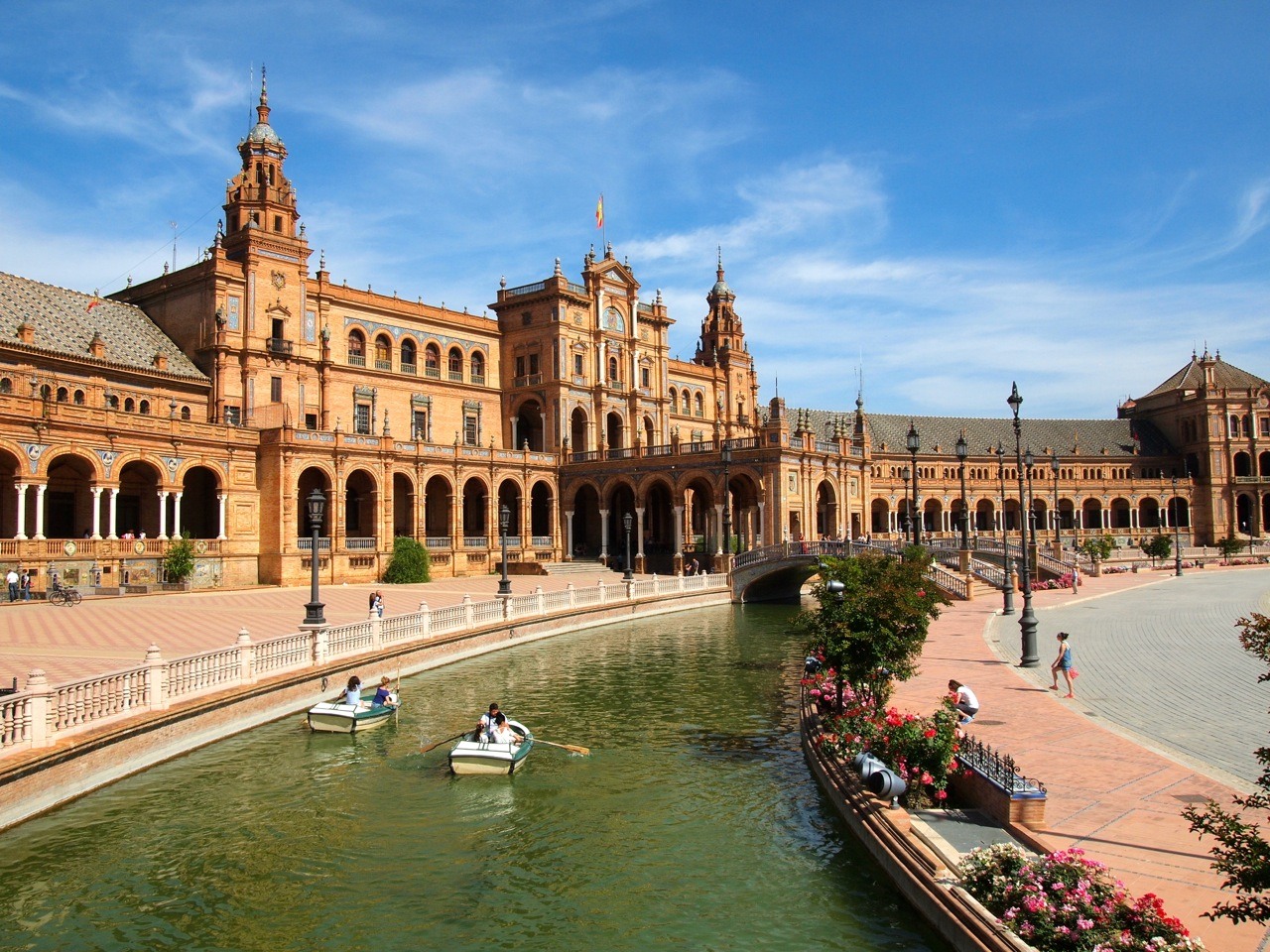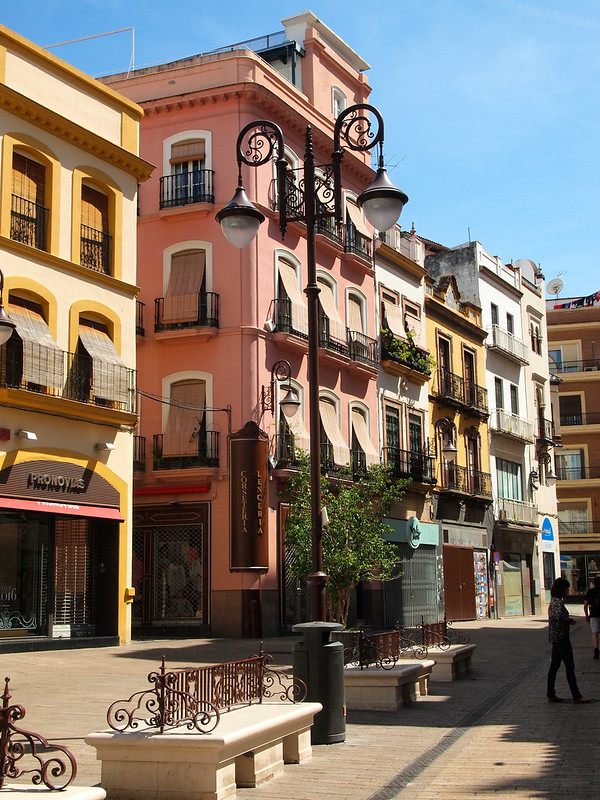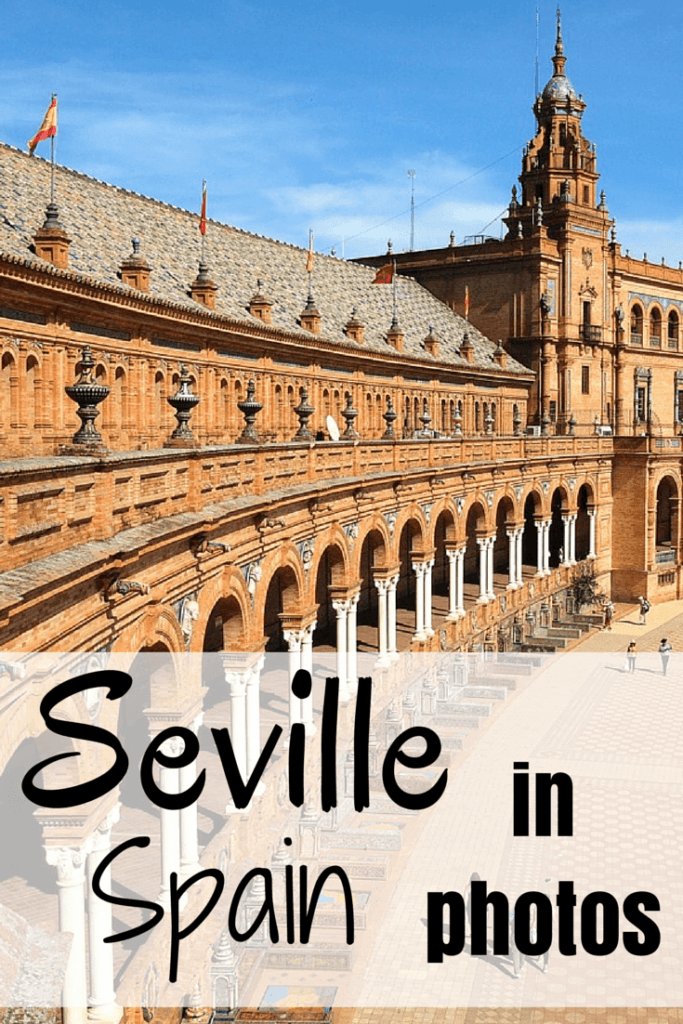7 Things You MUST See in Seville, Spain

Sevilla (Seville), Spain is the capital and largest city in Andalusia – and arguably one of the most beautiful cities in all of Spain.
Seville is different from any other large city in Spain. It's thousands of years old, and has been influenced by several different cultures throughout the centuries. This makes for a visually stunning city that is sure to leave an impression on you.
My first trip to Seville
After falling in love with Barcelona and its awesome architecture, I was reluctant to board the morning AVE train bound for Seville. I'd only had a few days in Barcelona, after all – not nearly enough time! But Seville, a city I'd wanted to visit longer than anywhere else in Spain, was calling.
And so I went.

Seville, located in Spain's southern Andalusia region, had always been intriguing to me. With its flamenco soul and Islamic history, I knew I would get a glimpse into a completely different side of Spain there.
Thankfully, Seville completely lived up to my expectations; I quickly found myself falling in love with yet another Spanish city.
Things to see in Seville
I spent four days exploring Seville. I took several tours to learn about its history and culture, and walked and walked and then walked some more to soak in all its gorgeous architecture.
Some of my favorite sights that you definitely need to see for yourself include:
1. Plaza de España

The spot I was most looking forward to visiting in Seville, Plaza de España (literally “Spain Square”) did not disappoint.
The covered walkways at Plaza de Espana were built in 1928 for the Ibero-American Exposition of 1929. The large complex was designed by Aníbal González, and mixes several architectural styles including Art Deco, Spanish Renaissance Revival, Spanish Baroque Revival, Neo-Mudéjar.

The building is a big half-circle, surrounded by a moat that's crossed by 4 bridges and often filled with little row boats. Make sure to pay attention to the detailed tile work on the outside, too! Tiled alcoves surround the plaza, each representing a different province of Spain.
2. Seville Cathedral

Seville's Cathedral (Catedral de Santa María de la Sede) is well worth a visit, too. It's the largest Gothic cathedral in the world, and is part of a UNESCO World Heritage Site in Seville.
The cathedral's history mirrors Seville's diverse history. It began as a mosque in the 1100s (completed in 1198), and was Christianized in the 1200s. The current Gothic cathedral was built on the same spot as the original mosque in the 1400s.
Inside, the grand cathedral is laid out as a five-aisled cruciform church with chapels, and houses the tomb of Christopher Columbus.

Next to the catheral sits the Giralda, the cathedral's bell tower. This 343-foot-tall tower is actually the former minaret of the original mosque, and was built to resemble to Koutoubia Mosque in Marrakech, Morocco.
You can visit both the Cathedral and climb the Giralda tower on a guided tour. Booking tickets in advance is highly recommended – and this ticket will help you skip the line!
3. Royal Alcázar

The Alcázar is one of Europe's oldest castles. The main portion of the castle you can visit today was built in the mid-1300s by King Peter I on the site of a previous Islamic palace built by the Almohad Caliphs in the 1100s.
King Peter wanted a palace like the Alhambra in Granada, and so hired many of the same architects to build the Alcazar in Seville (which is why it resembles the Alhambra so much!). The style the palace was built in is known as “ Mudéjar” – a mixture of Christian and Islamic architecture that includes lots of tiles and intricate archways.

The gardens at the Alcázar are also incredible, and probably were my favorite part of visiting!

The Alcázar is part of the UNESCO World Heritage Site in Seville along with the Seville Cathedral and Archivo de Indias.
Visiting the Alcázar on a guided tour is highly recommended – book an Alcazar and Cathedral combo tour here!
4. Setas de Sevilla

The Setas de Sevilla (Mushrooms) “grow” over a multi-story shopping center near La Encarnación square in the Old Town.
Originally titled Metropol Parasol, this mostly-wooden structure was designed by German architect Jürgen Mayer, and was completed in 2011.
Beneath the Mushrooms, you'll find a market, performance square, restaurants, and even an archaeological museum.
5. Palace of San Telmo

The Palace of San Telmo today acts as the seat of Andalusian government. When it was originally built in the 1600s, though, it was a marine academy. It's also served as a royal palace and a seminary over the years.
6. Interesting Old Town architecture
Seville's Old Town is walkable, and filled with all sorts of interesting architecture that reflects the city's long and rich history.



7. Torre del Oro

The Torre del Oro (“Tower of Gold”) on the Guadalquivir river was built in the 1200s by the Almohad Caliphate. It was used as both a watchtower over the river and a prison before being badly damaged by the Lisbon earthquake of 1755.
After being restored a couple times, today, a maritime museum is located on the top floor of the tower.
READ NEXT: Tips for Visiting Seville’s Feria de Abril as a Tourist
When to visit Seville
Being located in southern Spain means that Seville gets HOT during the summer months. Low season in Seville is actually June-August and into September because of the sky-high temperatures. I visited in April, and it was hot even then!
Fall, winter, and spring are the most popular times to visit Seville to take advantage of the weather.
Where to stay in Seville
Anywhere within Seville's Old Town is ideal for seeing all the best sites. My top hotel picks include:
- Hotel Casa del Poeta – consistently rated one of the best hotels in Seville (Read reviews | Book a room)
- Hotel Las Casas de El Arenal or Hotel Becquer – both beautiful boutique hotels that you can often find good deals on.
- Hotel Derby – a great more budget-friendly option; this is where I stayed! (Read reviews | Book a room)
Which photo is your favorite? Do any of them make you want to go to Seville right now?
LET'S PIN IT!

Amanda Williams is the award-winning blogger behind A Dangerous Business Travel Blog. She has traveled to more than 60 countries on 6 continents from her home base in Ohio, specializing in experiential and thoughtful travel through the US, Europe, and rest of the world. Amanda only shares tips based on her personal experiences and places she's actually traveled!











Sevilla- enchanting, enthralling, magical, awesome and more. I’ll go there in a heartbeat. I miss the sound of a live flamenco guitar, the scent of orange blossoms, the taste of huevas{deep fried fish roe),the visual delights of its intriguing architecture,the unbelievable baroque altars of its churches, its twisted cobbled stone alleyways and its lush gardens. Wow!
You’ve captured in beautifully in your comment, Raymond! It definitely is a gorgeous city.
My favorite is the first one of the Plaza de Espña as it reminds me one night with a friend when we discovered the place without anybody, complettly empty. I love Sevilla and Andalucia more generally.
I really loved this part of Spain, too – I’ll definitely be back!
Just came across this post – even after 8 years in Seville, I am still so enthralled by it! Just tried on my flamenco dresses in anticipation of the Fair! Had I know you were in town, I’d have loved to invite you for a rebujito.
That reminds me that I need to write my Feria post before April! 🙂 Seville definitely is beautiful. We did message when I was there last year, but we never managed to cross paths!
[…] many options gives me anxiety, too. For example, when I was in Seville in early 2015, I decided I would go out for dinner one night. I wanted to go somewhere for tapas. […]
My wife and I loved Seville. One of the highlights was renting a rowboat and cruising the canal at the Plaza de Espana. We definitely need to go back.
If I had been with someone else, I think we definitely would have done that too! Plaza de Espana is incredible, isn’t it?